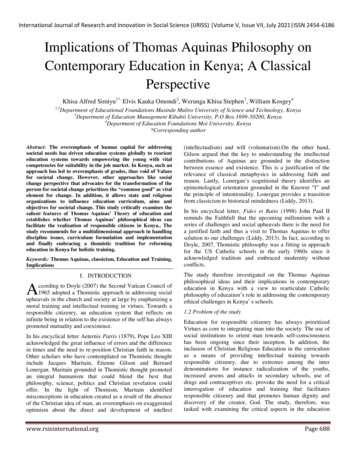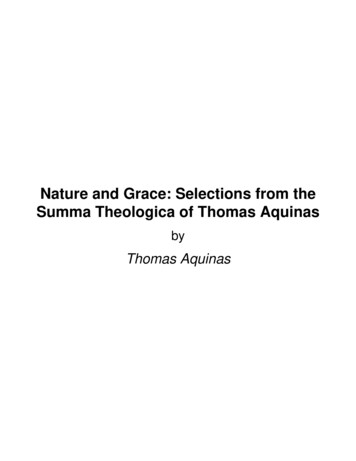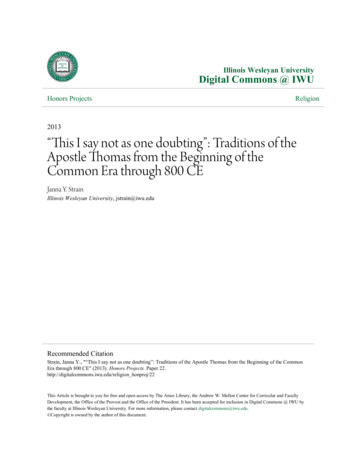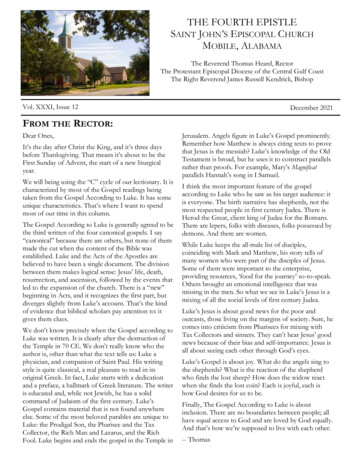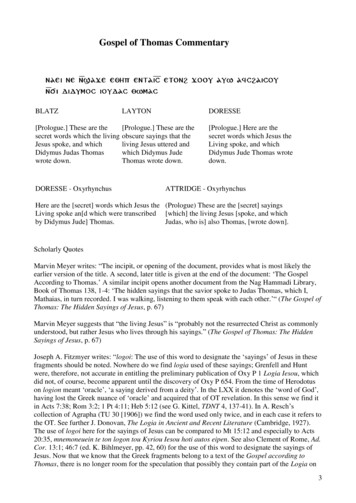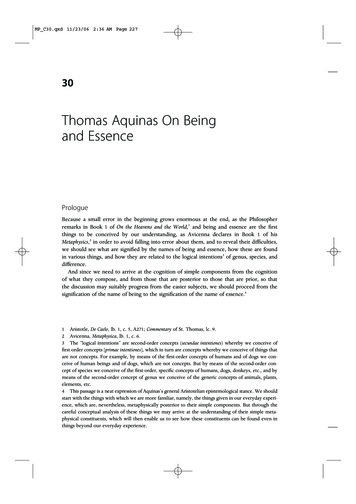
Transcription
MP C30.qxd 11/23/06 2:36 AM Page 22730Thomas Aquinas On Beingand EssencePrologueBecause a small error in the beginning grows enormous at the end, as the Philosopherremarks in Book 1 of On the Heavens and the World,1 and being and essence are the firstthings to be conceived by our understanding, as Avicenna declares in Book 1 of hisMetaphysics,2 in order to avoid falling into error about them, and to reveal their difficulties,we should see what are signified by the names of being and essence, how these are foundin various things, and how they are related to the logical intentions3 of genus, species, anddifference.And since we need to arrive at the cognition of simple components from the cognitionof what they compose, and from those that are posterior to those that are prior, so thatthe discussion may suitably progress from the easier subjects, we should proceed from thesignification of the name of being to the signification of the name of essence.41 Aristotle, De Caelo, lb. 1, c. 5, A271; Commentary of St. Thomas, lc. 9.2 Avicenna, Metaphysica, lb. 1, c. 6.3 The “logical intentions” are second-order concepts (secundae intentiones) whereby we conceive offirst-order concepts [primae intentiones], which in turn are concepts whereby we conceive of things thatare not concepts. For example, by means of the first-order concepts of humans and of dogs we conceive of human beings and of dogs, which are not concepts. But by means of the second-order concept of species we conceive of the first-order, specific concepts of humans, dogs, donkeys, etc., and bymeans of the second-order concept of genus we conceive of the generic concepts of animals, plants,elements, etc.4 This passage is a neat expression of Aquinas’s general Aristotelian epistemological stance. We shouldstart with the things with which we are more familiar, namely, the things given in our everyday experience, which are, nevertheless, metaphysically posterior to their simple components. But through thecareful conceptual analysis of these things we may arrive at the understanding of their simple metaphysical constituents, which will then enable us to see how these constituents can be found even inthings beyond our everyday experience.
MP C30.qxd 11/23/06 2:36 AM Page 228PHILOSOPHY OF NATURE, PHILOSOPHY OF THE SOUL, METAPHYSICS228Chapter 1. The Meanings of the Names of Being and Essence5We should know that, as the Philosopher says in Book 5 of the Metaphysics, something issaid to be a being [ens per se] 6 in two different senses: in one sense, [only] those things [arecalled beings] that are sorted into the ten categories; in the other sense [calling something abeing] signifies the truth of a proposition. And the difference between the two is that in thesecond sense everything can be said to be a being of which a [true] affirmative propositioncan be formed, even if it posits nothing in reality; it is in this way that privations and negations are said to be beings, for we say that an affirmation is the opposite of negation, andthat there is blindness in an eye. But in the first sense only that can be said to be a beingwhich posits something in reality.7 Therefore, blindness and the like are not beings in thefirst sense. So, the name “essence” [essentia] is not derived from “being” [ens] in the secondsense (for some things are said to be beings in this sense although they do not have an essence,as is clear in the case of privations), but from “being” as it is used in the first sense. This iswhy the Commentator remarks in the same passage: “ ‘Being’ in the first sense signifies thesubstance of the thing.” 8And since, as has been said, beings in this sense are sorted into the ten categories;“essence” has to signify something that is common to all natures on account of whichvarious beings fall under the diverse genera and species, as for example humanity is the essenceof man, and so on for the rest. And because that by which a thing is constituted in its propergenus or species is what we signify by the definition indicating what [quid] this thing is, philosophers changed the name of essence into the name “quiddity” [quidditas], and this is whatthe Philosopher in Book 7 of the Metaphysics often calls “what something was to be” [quod5 The division of the text into seven chapters follows the Boyer edition, used for this translation(“Opusculum De ente et essentia, introductione et notis auctum,” ed. C. Boyer, Textus et Documenta,Series Philosophica, 5: Pontificia Universitas Gregoriana (Rome, 1933)). The chapter titles are addedby the translator.6 Aristotle, Metaphysics, Bk. 5, c. 7, 1017a22–3; Commentary of St. Thomas, lc. 7. In the passage towhich Aquinas refers, Aristotle contrasts “coincidental being” (ens per accidens) with “non-coincidentalbeing” [ens per se]. A coincidental being is something identified on the basis of merely coincidental features, on account of which it would belong to two different categories; for example, a tall musician,described as such, is a merely coincidental being, described in terms of a quantity (height) and a quality (a capacity to play music). So, the person conceived and described in this way is a merely coincidental being, an ens per accidens. On the other hand, the same person considered merely as a humanbeing, as such, is not described in coincidental terms, so, the person considered in this way is an ensper se. Obviously, the distinction itself is not a real distinction between two different sorts of things,but a mere distinction of reason between different ways of conceiving of the same thing.7 This, initially puzzling, distinction between the two main senses of the term “being” is what is oftenreferred to as the distinction between “real being” (ens reale) and “being of reason” (ens rationis) (sometimes also referred to as “being as true” (ens ut verum)). The distinction will at once be less puzzling,if it is read in its proper context, i.e., the “inherence theory of predication” and the correspondingtheory of signification, assumed here by Aquinas, without any preliminary explanation. For detailedanalyses of this distinction along these lines, see G. Klima, “The Semantic Principles Underlying SaintThomas Aquinas’s Metaphysics of Being,” Medieval Philosophy and Theology, 5 (1996), pp. 87–141;“Aquinas’ Theory of the Copula and the Analogy of Being,” Logical Analysis and History of Philosophy,5 (2002), pp. 159 –76; “The Changing Role of Entia Rationis in Medieval Philosophy: A ComparativeStudy with a Reconstruction,” Synthese 96 (1993), pp. 25–59.8 Averroës, In Metaph., lb. 5, com. 14.
MP C30.qxd 11/23/06 2:36 AM Page 229quid erat esse], that is to say, that on account of which something is what it is. It is also called“form,” because “form” signifies the perfection and determinate character [certitudo] of everything, as Avicenna says in Book 2 of his Metaphysics.9 It is also called “nature,” taking“nature” in the first of the four senses assigned to it by Boethius in his On Two Natures,10namely, in the sense in which a nature is said to be that which can in any way be apprehended by the intellect. For a thing is intelligible only on account of its essence anddefinition; and it is also in this sense that the Philosopher in Book 5 of the Metaphysics saysthat every substance is a nature. But the name “nature” taken in this way seems to signifythe essence of a thing insofar as it is related to the thing’s proper operation, since nothingis deprived of its proper operation. The name “quiddity,” on the other hand, is derived fromthe fact that it is signified by the definition; but it is called “essence” [essentia], because it isthat through which and in which a thing has its being [esse].Chapter 2. The Essence of Material SubstancesBut because a substance is said to be a being primarily and without qualification, whereasan accident is a being only secondarily and, as it were, with qualification, only a substancehas an essence in a strict and true sense, while an accident has it only somehow, withqualification.Some substances are simple, others are composite, and both sorts have their essence, butthe simple ones in a more genuine and excellent way, just as they have a more excellentway of being. For they are the cause of the composite ones; at least this is true of the first,simple substance, which is God.However, since the essences of these substances are quite hidden from us, we shouldbegin with the essences of composite substances, so that our discussion may more suitablyproceed from the easier subjects.In composite substances, therefore, form and matter are known [components],11 as aresoul and body in man. But it cannot be said that one of these alone should be called theessence of the thing. That matter alone is not the essence of the thing is clear, becausethe thing is knowable through its essence, and it is on account of its essence that it fallsunder its proper species and genus; but its matter is not the principle of cognition of thething, and it is not on account of its matter that a thing is determined to be in its propergenus or species, but that on account of which it actually exists. However, the form of athing alone cannot be said to be its essence either, even if some people want to make thisclaim.12 For on the basis of what has been said so far it is clear that the essence of a thingis what its definition signifies. But the definition of things of nature contains not onlyform, but matter as well; otherwise natural definitions would not differ from mathematical9 Avicenna, Metaph., 1, 6; 2, 2.10 De persona et duabus naturis, c. 1. Migne Patrologia Latina (ML), 64, 1341.11 Matter and form are the obviously given metaphysical components of any material substance, asit is clear from the hylomorphic analysis of physical change, provided by Aquinas in his On the Principlesof Nature.12 In particular, Averroës and his followers made this claim against Avicenna. Aquinas sides withAvicenna on the issue. Cf. Aquinas, In Metaphysica, lb. 7, lc. 9, n. 1467; In Quattuor Libros SententiarumPetri Lombardi (SN ) 4, d. 44, q. 1, a. 1b, resp. 2.AQUINAS ON BEING AND ESSENCE229
MP C30.qxd 11/23/06 2:36 AM Page 230PHILOSOPHY OF NATURE, PHILOSOPHY OF THE SOUL, METAPHYSICS230definitions.13 And it cannot be said that matter is included in the definition of a naturalsubstance as something added to its essence, or as something existing outside of its essence,for this sort of definition is proper to accidents, which do not have perfect essence, and therefore they have to receive in their definition their subject, which is outside their essence.14It is clear, therefore, that essence comprises both matter and form.Nevertheless, it cannot be said that “essence” signifies a relation between matter and form,or something superadded to these, because that would necessarily be an accident or extrinsicto the thing, and the thing would not be known on account of it, none of which can applyto an essence. For by the form, which is the actuality of matter, matter is made into an actualbeing and this [particular] thing [hoc aliquid]. Therefore, whatever supervenes does not giveactual being to matter absolutely speaking, but it makes it actual in some respect, just asaccidents do, as whiteness makes something actually white. So, when a form of this sort isacquired, the thing is not said to be generated absolutely speaking, but only in some respect.What remains, therefore, is that the name “essence” in composite substances signifies whatis composed of matter and form. And Boethius agrees with this position in his Commentaryon the Categories, when he says that ousia signifies something composite; for ousia signifiesthe same for the Greeks as “essence” does for us, as he says in his On Two Natures. Avicennaalso says that the quiddity of composite substances is the composition of matter and formitself.15 And even Averroës declares in his Commentary on Book 7 of the Metaphysics: “thenature that the species of generable and corruptible things have is a certain intermediary,that is, composed of matter and form.”16And reason agrees with this as well, for the act of being [esse] of a composite substance isneither of the form alone, nor of matter alone, but of the composite itself; and the essenceis that on account of which the thing is said to be. Therefore, the essence, on account ofwhich the thing is denominated a “being,” cannot be the form alone or the matter alone,but has to be both, although it is the form that causes this act of being in its own way. Wecan see also in cases of other things composed of several principles that the thing is not denominated on account of only one of those principles that constitute it, but on account of whatcomprises both, as is clear in the case of flavors: for sweetness is caused by the action ofwarmth spreading wetness, and although in this way warmth causes sweetness, still, a bodyis not denominated sweet on account of its warmth, but on account of its flavor, which comprises both warmth and wetness.1713 For example, the geometrical definition of a sphere would not differ from the natural definitionof a pearl. But even if all pearls are essentially spherical (more or less), they also essentially consist oflayers of crystallized calcium carbonate held together by conchiolin, which is why not all spherical bodies are pearls.14 This point is discussed in more detail in c. 7 below, considering the definition of “pugness,” whichis necessarily a curvature of a nose, but in and of itself is the curvature only, having to have a nose asits subject. Cf. also n. 67 below.15 Avicenna, Metaph., 5, 5.16 Averroës, In Metaph., 7, 7, com. 27.17 The example, based on the somewhat obscure Aristotelian doctrine of how the composite qualities of mixed bodies can be derived from the interaction of the simple active and passive qualities ofthe four elements, is not very illuminating to us. But the point is clear, and can, in fact, be illustratedby another, more familiar example: punch flavor is caused by mixing various fruit juices (and maybesome rum). Still, a punch-flavored cake or scoop of ice cream is not denominated by any of the components, but by the composite flavor resulting from the mixture.
MP C30.qxd 11/23/06 2:36 AM Page 231However, since the principle of individuation is matter, from this it may appear tofollow that the essence, which comprises both matter and form, is only particular and notuniversal, from which it would further follow that universals would not have definitions, ifan essence is something that the definition signifies.And for this reason we should know that matter considered in just any way is not theprinciple of individuation, but only designated matter is. And by designated matter I meanmatter considered under determinate dimensions. This matter is not included in thedefinition of man as such, but it would be included in Socrates’ definition, if Socrates had adefinition. The definition of man, on the other hand, includes non-designated matter; for thedefinition of man does not include this bone or this flesh, but bones and flesh absolutely,which are the non-designated matter of man.18Chapter 3. The Composition of Material SubstancesIn this way it is clear that the essence of man and the essence of Socrates differ only as designated and non-designated, and this is why the Commentator declares in his Commentaryon Book 7 of the Metaphysics: “Socrates is nothing other than animality and rationality, whichare his quiddity.”19 It is also in the same way that the essence of the genus and the essenceof the species differ as designated and non-designated, although the manner of designationis different in the two cases. For the designation of the individual with respect to the speciestakes place through matter determined by dimensions, whereas the designation of thespecies regarding the genus occurs through a constitutive difference, which is taken fromthe form of the thing.But the determination or designation of the species with respect to the genus is not throughanything in the essence of the species that would in no way be in the essence of the genus;rather, whatever is in the species is also in the genus indeterminately. For if an animal werenot the same as the whole that is a man, but only a part of it, then animal would not bepredicated of man, for no integral part is predicated of its whole.We can see how this happens if we consider how body, insofar as it is taken to be a partof an animal, differs from body, insofar as it is taken to be a genus; for it cannot be a genusin the sense in which it is an integral part. The name “body,” therefore, can be taken inseveral senses. For a body, insofar as it is in the genus of substance, is said to be a bodybecause it has a nature on account of which three dimensions can be designated in it; while18 It is important to note here that the difference between designated and non-designated matteris, again, not a difference between two different kinds of entities, but rather a difference between twodifferent ways of considering the same kind of entity; that is to say, the distinction between designatedand non-designated matter is not a real distinction, but a distinction of reason. All matter in reality isdesignated matter, i.e., concrete chunks of matter existing under the determinate dimensions of theindividual bodies they constitute. But just as the individuals can be considered in a universal manner,disregarding their individuating features, so their matter can be considered generally, not as this orthat particular chunk of matter. And it is obvious that it is only matter considered in this way thatcan be signified by the definition of the species (the definition that signifies the specific essence of eachindividual), for it is clear that the definition of man, for example, cannot signify the flesh and bonesof Socrates as this particular matter belonging to Socrates, for otherwise all men (i.e., all individualshaving the essence signified by this definition) ought to have Socrates’ flesh and bones, which is clearlyabsurd. Cf. n. 26 below.19 Averroës, In Metaph., 7, c. 5, com. 20.AQUINAS ON BEING AND ESSENCE231
MP C30.qxd 11/23/06 2:36 AM Page 232PHILOSOPHY OF NATURE, PHILOSOPHY OF THE SOUL, METAPHYSICS232the three designated dimensions themselves are the body which is in the genus of quantity.But it happens that something that has some perfection also reaches a further perfection, asis obvious in the case of man, who has a sensitive nature and beyond that also an intellective one. Likewise, to the perfection of a thing’s having a form on account of which threedimensions can be designated in it, a further perfection can be added, such as life, or something like that. The name “body,” therefore, can signify something which has a form fromwhich there follows the designatability of three dimensions exclusively, namely, in such waythat from that form no further perfection would follow, but if something is added, then itis beyond the signification of “body” in this sense. And in this sense the body will bean integral and material part of an animal, for in this way the soul will be beyond the significationof the name “body,” and it will be superadded to the body itself, so that the animal will beconstituted from these two, namely, from the soul and the body, as its parts.But the name “body” can also be taken to signify some thing that has a form on accountof which three dimensions can be designated in it, whatever that form may be, whether itmay give rise to some further perfection or not. And in this sense body will be a genus ofanimal, because animal contains nothing that is not contained implicitly in body. For the soulis not another form than that on account of which in that thing three dimensions can bedesignated;20 and so when it was said that a body is something that has a form on accountof which three dimensions can be designated in it, this form was understood to be any form,regardless of whether it is animality or lapideity [rock-ness] or anything else of this sort.And in this way the form of animal is implicitly contained in the form of body, insofar asbody is its genus.There is a similar relationship between man and animal. For if “animal” only named a thingthat has the perfection of sensing and moving on account of an intrinsic principle with theexclusion of any further perfection, then any further supervening perfection would be relatedto animal as to a part, and not as implicitly contained in the notion of animal. And in thisway animal would not be a genus. But it is a genus insofar as it signifies a certain thing whoseform can give rise to sensation and motion, no matter what sort of form it is, whether it isa sensitive soul only or a soul that is sensitive and rational as well. In this way, therefore,the genus indeterminately signifies the whole that is in the species, for it does not signifyonly matter.Likewise, the difference signifies the whole and not only form; and even the definitionsignifies the whole, as does the species, but in different ways. For the genus signifies the wholeas a certain denomination determining what is material in the thing without determining itsproper form; and the genus is taken from matter, although it is not matter. Hence it is clearthat something is said to be a body because it has the perfection that three dimensions canbe designated in it, which is a perfection that is related as something material to the furtherperfections. The difference, on the other hand, is a certain determination taken from a determinate form without having some determinate matter in its primary notion, as is clear inthe case of animate, namely, something that has a soul [anima], for this does not determine20 This is an important expression of Aquinas’s famous, and in his time very controversial, thesis ofthe unity of substantial forms. For a detailed discussion of this passage, see G. Klima, “Man Body Soul: Aquinas’s Arithmetic of Human Nature,” in B. Davies (ed.), Thomas Aquinas: ContemporaryPhilosophical Perspectives, Oxford: Oxford University Press, pp. 257–73. For more discussion of the thesis and its history, see D. A. Callus, “Forms, Unicity and Plurality of,” in New Catholic Encyclopedia,New York: McGraw-Hill; 1967–79.
MP C30.qxd 11/23/06 2:36 AM Page 233what sort of thing it is, whether a body or something else. This is why Avicenna says21 thatthe genus is not understood in the difference as a part of its essence, just as their subject isnot part of the understanding of attributes [ passiones]; and so the genus is not predicated ofthe difference per se, as the Philosopher remarks in Book 3 of the Metaphysics and Book 4of the Topics,22 except, perhaps, in the way the subject is predicated of the attribute. But thedefinition and the species comprise both, namely, the determinate matter designated bythe name of the genus and the determinate form designated by the name of the difference.And from this it is clear why the genus, difference, and species are analogous to matter,form, and the composite in nature, although they are not identical with them. For the genusis not matter, but is taken from matter as signifying the whole, and the difference is not form,but is taken from the form as signifying the whole. Therefore, we say that man is a rationalanimal, but not that man is composed of animal and rational, as we say that man is composedof body and soul. For man is said to be composed of soul and body, as a third thing constituted by two things, neither of which is identical with it. For a man is neither soul norbody. But if man is somehow said to consist of animal and rational, then it will not be a thirdthing constituted by two other things, but rather a third concept constituted by two otherconcepts. For the concept of animal does not determine the specific form expressing the natureof the thing, because it is material with respect to the ultimate perfection; and the concept ofthe difference rational consists in the determination of the specific form; and the conceptof the definition or species is constituted by these two concepts. Therefore, just as a thingconstituted by others cannot be said to be any of those that constitute it, so a conceptcannot be said to be any of the concepts that constitute it; for we do not say that the definitionis the genus or the difference.Although the genus signifies the entire essence of the species, still, the several species inthe same genus do not have to have the same essence; for the unity of the genus stems fromits indetermination or indifference. However, this does not happen in such a manner thatwhat the genus signifies is some numerically one nature in the diverse species having someother thing supervening on it, namely, the difference determining it, as the form determinesmatter that is numerically one; rather, this happens because the genus signifies some form,but not determinately this or that form, which in turn is determinately expressed by thedifference; however, this [determinately expressed form] is nothing else but what wasindeterminately signified by the genus.23 And this is why the Commentator says in hisCommentary on Book 12 of the Metaphysics that prime matter is said to be one on accountof the removal of all forms, but the genus is one on account of the community of the formsignified.24 So, it is clear that the addition of the difference, which removes the indetermination that was the cause of the unity of the genus, yields essentially diverse species.And since, as has been said, the nature of the species is indeterminate with respect to theindividual, just as the nature of the genus is with respect to the species, therefore, just as21 Avicenna, Metaph., 5, 6.22 Aristotle, Metaph., 3, 3, 998b24; St. Thomas’s Commentary, lc. 7; Topics, 4, 2, 122b20; 6, 6, 144a32.23 So, “animal” indeterminately signifies the animality of Socrates and the animality of his dog. ButSocrates’ animality is nothing else but his humanity, which is determinately signified by the difference“rational,” and his dog’s animality is nothing else but his “caninity” (dogginess), which is determinatelysignified by the proper specific difference of dogs (whatever that is).24 Averroës, In Metaph., 12, com 14.AQUINAS ON BEING AND ESSENCE233
MP C30.qxd 11/23/06 2:36 AM Page 234PHILOSOPHY OF NATURE, PHILOSOPHY OF THE SOUL, METAPHYSICS234the genus, insofar as it is predicated of the species, contains25 in its signification everythingthat is determinately in the species, although indistinctly, so the species, insofar as it ispredicated of the individual, has to signify everything that is essentially in the individual, althoughindistinctly; and this is how the essence of the species is signified by the name “man”;therefore, “man” is predicated of Socrates. However, if the nature of the species is signifiedwith the exclusion of designated matter, which is the principle of individuation, then it isrelated to the individual as its part, and this is how it is signified by the name “humanity”;for “humanity” signifies that on account of which a man is a man. But designated matter isnot that on account of which a man is a man, and so it is not contained in any way amongthe things from which a man has it that he is a man. Since, therefore, “humanity” includes inits understanding only those things from which a man has it that he is a man, it is clear thatdesignated matter is excluded or cut off from its signification. And since a part is not predicated of the whole, this is why “humanity” is not predicated of a man or of Socrates.26 This iswhy Avicenna remarks that the quiddity of the composite [substance] is not the composite[substance], although the quiddity itself is composite; just as humanity, even if it is composite,nevertheless, is not a man, but it has to be received in something, which is designated matter.But, as has been said, the designation of the species regarding the genus is by meansof forms, whereas the designation of the individual regarding the species is by means of25 We get this translation by amending the text with the addition of the obviously missing verb“continet.”26 That is to say, the propositions: “A man is a humanity” and “Socrates is a humanity” are false.This is an expression of Aquinas’ metaphysical claim that a material substance cannot be identical withits essence, but its essence is its part that is really distinct both from the whole and from the other partof the same individual, namely, its designated matter. Note that the real distinction between the specificessence and the designated matter of the same individual is not the same as the real distinction betweenthe matter and substantial form of the same individual, although both distinctions are based on themateriality of the individual in question. These are two different ways of conceptually “carving up”the same individual. (This does not have to mean, however, that the parts thus distinguished are notreally distinct: just because we can conceptually distinguish the left half and the right half, as well asthe top half and the bottom half of a body, it does not mean that these parts are not really distinctregardless of whether we distinguish them or not.) The (prime) matter and substantial form of thesame individual are distinguished on account of the analysis of substantial change: the prime matterof a thing is what takes on a new substantial form when the thing ceases to be, and a new thing comesto be from it, say, when hydrogen turns into helium in a nuclear fusion, or when a living being diesand turns into a corpse. Therefore, the form so distinguished excludes this matter from its notion. Butthe essence signified by the definition, as we could see above, does not exclude matter in general,but only this designated matter in particular (see n. 18 above), and only when it is signified exclusively,by the abstract form of the name of the spe
228 PHILOSOPHY OF NATURE, PHILOSOPHY OF THE SOUL, METAPHYSICS Chapter 1. The Meanings of the Names of Being and Essence5 We should know that, as the Philosopher says in Book 5 of the Metaphysics, something is said to be a being [ens per se]6 in two different senses: in one sense, [only] those things [arecalled beings] that are sorted into the ten categories; in the other sense [calling something a
